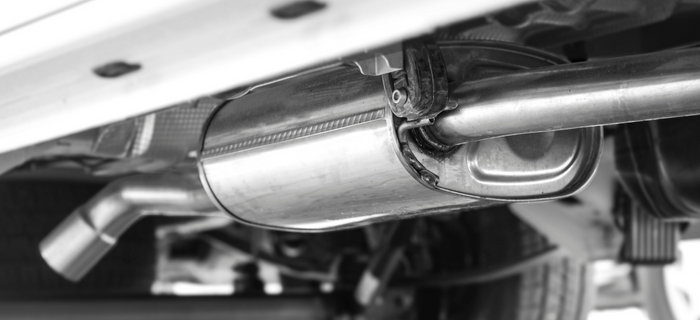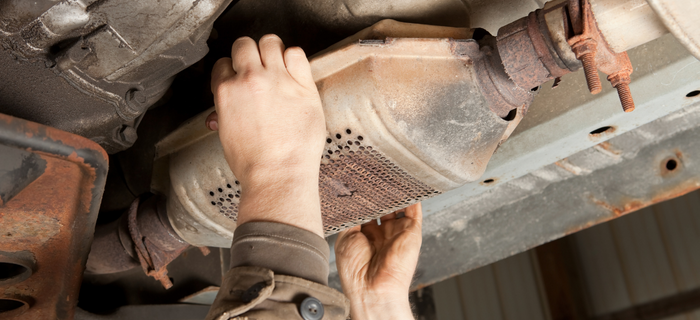
What is a catalytic converter
If you own a car or have ever been around one, you may be familiar with the term "catalytic converter". However, what precisely is a catalytic converter, and why is it an essential component of your vehicle's exhaust system?
This blog post examines the workings of a catalytic converter, and why it plays an important role in minimising harmful emissions from cars and other vehicles. Keep reading for our in-depth introduction to catalytic converters.
What does a catalytic converter do?
The key role of a catalytic converter in a vehicle's exhaust system is to minimise the emission of harmful pollutants and gases emitted by the engine, such as carbon monoxide, nitrogen oxides, and hydrocarbons, prior to their release into the atmosphere. This contributes towards improving air quality and protecting public health.
The catalytic converter operates by using a chemical reaction to transform the harmful pollutants into less harmful substances. Inside the converter, there are two types of catalysts: a reduction catalyst and an oxidation catalyst. The reduction catalyst transforms nitrogen oxide into nitrogen and oxygen, while the oxidation catalyst converts carbon monoxide and hydrocarbons into carbon dioxide and water vapor.
The catalysts are usually made of precious metals, such as platinum, palladium, and rhodium, which aid in the chemical reaction. As the exhaust gases pass through the catalytic converter, they come into contact with the catalysts. This interaction causes the harmful pollutants to react and transform into less harmful substances.
Do all cars have a catalytic converter?
In the UK, all new cars have been required to have a catalytic converter since 1993. This requirement was introduced as part of the European Union's emissions standards, which were designed to reduce harmful pollutants emitted by vehicles. The use of catalytic converters in cars has been a legal requirement in the UK since then, and it is an offence to drive a car without one fitted.
In addition to new cars, all cars that were registered before 1993, and which are still in use, are also required to have a catalytic converter fitted if they are driven within designated low emission zones or other areas with air quality concerns.
How long do catalytic converters last for?
The lifespan of a catalytic converter can vary depending on various factors, such as driving conditions, maintenance, and the quality of the converter itself. Typically, a well-maintained catalytic converter can last for up to 100,000 miles or more.
That being said, a catalytic converter can fail prematurely for several reasons. One common cause is the build-up of engine deposits, which can block the converter and stop it from functioning correctly. Other factors that can lead to premature failure include overheating, physical damage, and exposure to corrosive materials.
The lifespan of a catalytic converter can be extended by performing regular vehicle maintenance, such as regular oil changes and tune-ups. If you think that your catalytic converter is not operating correctly, you should have it inspected and repaired by a qualified mechanic to ensure that it is working correctly.
What are the signs of catalytic converter failure?
There are several signs of catalytic converter failure that you can look out for. Here are some common indications:
Loud Exhaust Noise: If the catalytic converter is clogged or damaged, it can cause your vehicle's exhaust system to make a loud noise.
Rough Idling: You may notice your engine idling roughly or hesitating when you press the accelerator.
Check Engine Light: If your vehicle's onboard diagnostic system detects an issue with the catalytic converter, it may illuminate the check engine light on your dashboard.
Exhaust Smells Bad: A failing catalytic converter can cause a noticeable increase in exhaust smell.

What are the signs that my catalytic converter has been stolen?
Thieves frequently aim for catalytic converters due to the precious metals like platinum, palladium, and rhodium they contain, which can fetch a high market price. If your catalytic converter is stolen, there are various signs that you may notice. If your catalytic converter gets stolen, there are several indications that you might observe:
Loud Exhaust Sound: Without the catalytic converter, your vehicle's exhaust system will produce a loud, rumbling sound that is typically much louder than normal.
Reduced Engine Performance: You may observe a big reduction in your vehicle's performance, such as decreased acceleration and reduced fuel efficiency.
Warning Lights: Your vehicle's onboard diagnostic system may detect that the catalytic converter is missing or not operating correctly, and illuminate the "check engine" light or another warning light on your dashboard.
Scraped or Damaged Exhaust System: Thieves may use a saw or other cutting tool to remove the catalytic converter, leaving behind damage to the exhaust system or visible signs of forced entry.
Tips: Catalytic Converter Theft Prevention
Here are just some of the steps you can take to help prevent the theft of your car’s catalytic converter:
Whenever possible, choose to park your car in a well-lit and busy area. Thieves are less inclined to focus on vehicles in areas where they might be easily spotted.
If you have a garage, make use of it to store your vehicle. This significantly reduces the risk of theft since thieves often target vehicles parked on the street or in driveways.
Installing security cameras around your property can deter thieves and provide evidence in case of an incident.
Consider using steering wheel locks or wheel locks to make it more challenging for thieves to steal your vehicle in the first place.
Motion sensor lights near where you park your vehicle can startle potential thieves and draw attention to their actions.
Remember that while these measures can reduce the risk of catalytic converter theft, no method is foolproof. It's important to assess your situation, use a combination of preventative strategies, and remain cautious to minimise the likelihood of falling victim to catalytic converter theft.
In conclusion, catalytic converters play a vital role in reducing harmful emissions from vehicles and protecting the environment. Their use is a legal requirement in most countries, including the UK, and failure to comply can result in fines or other penalties. By understanding the importance of catalytic converters and taking measures to protect them, we can all help to maintain clean air and protect our planet for future generations.
If you’ve found this article interesting, visit our Facebook page for more tips and motoring advice. Also, view our related article - What is cruise control in cars? Also, if you're interested in leasing a vehicle, click here to view our current special offers.
About The Author: Charlotte Kennedy
Charlotte joined the GB Vehicle Leasing team around 6 years ago starting out as an apprentice and is now being a key member of our marketing team.
Find Out More About CharlotteLatest Posts

Vehicle Delivery Lead Times Explained
From custom factory orders to in...

BYD Dolphin Review 2025
A splash of genius? Here's our...

Guide to Lease Van Modifications
Everything about modifying a lease van...

Free Nationwide Delivery Explained
Learn more about free convenient delivery...

Cupra Tavascan Review: All The Highlights
The Cupra Tavascan has arrived, and...



































